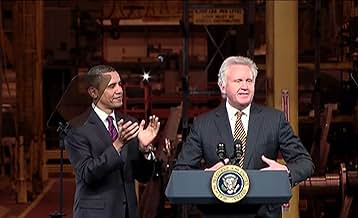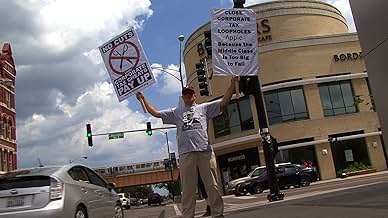An exposé on how the government has allowed U.S. corporations to avoid paying taxes and the growing wave of discontent that it has fostered.An exposé on how the government has allowed U.S. corporations to avoid paying taxes and the growing wave of discontent that it has fostered.An exposé on how the government has allowed U.S. corporations to avoid paying taxes and the growing wave of discontent that it has fostered.
- Directors
- Writers
- Stars
- Awards
- 1 win & 4 nominations total
Bernie Sanders
- Self - Senator, Vermont
- (archive footage)
Jeffrey A. Winters
- Self - Professor of Political Economy, Northwestern University
- (as Jeffrey Winters)
Daniel Garvin
- Self - UK Uncut
- (archive footage)
- Directors
- Writers
- All cast & crew
- Production, box office & more at IMDbPro
Featured reviews
10oitanow
This movie brings the issues to the audience in a succinct manner. You wouldn't think that a movie about finances would have a compelling story but it sure does. It keeps you interested and by the end I feel fired up over the issues. One of those movies you wish all the politicians could watch. The music and graphics help to move the movie along and the graphics help to keep the story organized and flowing. Definitely recommend this movie to any and all. Also showed this movie to a friend of mine and he felt the same that the movie was really high quality and helped him to think about his political views. One of the other points of this movie that I liked was that it was not focusing on bashing a political view, but was showing how politicians on both sides have given into the big company pressures. (could say more on that, but will leave it to you to enjoy)
Corporations hardly pay any taxes by abuse of international tax laws and there are groups that are protesting this. These are facts that are exceedingly well known, and most agree that we should do something about it.
But what? How can we close these tax loopholes? What initiatives and bills are currently trying to fight this problem?
That's what I wanted to know. But the documentary doesn't explain it in the slightest. In fact, it doesn't really explain anything. It just shows some experts explaining that it is indeed bad. And shows over 20 interviews with students who say they were inspired by something on Facebook and decided to protest against big corporations. While surely the tax code is to blame.
I can honestly say I learned nothing from this documentary.
But what? How can we close these tax loopholes? What initiatives and bills are currently trying to fight this problem?
That's what I wanted to know. But the documentary doesn't explain it in the slightest. In fact, it doesn't really explain anything. It just shows some experts explaining that it is indeed bad. And shows over 20 interviews with students who say they were inspired by something on Facebook and decided to protest against big corporations. While surely the tax code is to blame.
I can honestly say I learned nothing from this documentary.
This documentary, while making a good point about economic disparities, was ridiculous. Incredible experts were brought in who made valid points about things such as transfer pricing (which is perfectly legal), but these experts were largely swept under the rug by the directors of the film.
The important thing to note about the issue of the "1%" and similar groups is not that we can whine about economic disparities. The movements that did all the complaining have nearly disappeared only a short time out from when they began.
The important thing to realize is that these corporations are working within their legal rights to be as profitable as possible. Corporations seek profit. It's inherent in their nature. We can't blame them for that. The problem lies in the laws that allow them to do so, and the documentary did not point that out enough.
The solution is to change the laws, not glorify those who are complaining to corporations who work within their legal bounds to achieve their goal of profit production. All this documentary seemed to do was glorify those who are good at complaining, but to the wrong people.
The important thing to note about the issue of the "1%" and similar groups is not that we can whine about economic disparities. The movements that did all the complaining have nearly disappeared only a short time out from when they began.
The important thing to realize is that these corporations are working within their legal rights to be as profitable as possible. Corporations seek profit. It's inherent in their nature. We can't blame them for that. The problem lies in the laws that allow them to do so, and the documentary did not point that out enough.
The solution is to change the laws, not glorify those who are complaining to corporations who work within their legal bounds to achieve their goal of profit production. All this documentary seemed to do was glorify those who are good at complaining, but to the wrong people.
This was a pretty interesting documentary. It was about something everybody already knows about and yet a lot of people don't. Up til now I thought corporations got a lot of breaks, I had NO idea in some cases they paid nothing and in others actually got money in rebates.
It was interesting to see the complexity of the tax code tied in with politicians unwillingness or inability to change any of it, it paints a bleak picture for the future of the US and shows just how manipulative corporations given the freedom can be.
The story telling of this was ok, I found it fast enough and interesting enough to keep watching. I think though it might have benefited from a human narrator vs text on screen to liven it up a bit. The content is what really pushes this documentary up to a 6. It was a bit repetitive showing the protesting over and over again even though it nails home the whole David vs Goliath idea and how hopeless it seems. I think the movie was trying to go for a more positive spin here where you can get out and can make a difference but thats not how I saw it.
It was interesting to see the complexity of the tax code tied in with politicians unwillingness or inability to change any of it, it paints a bleak picture for the future of the US and shows just how manipulative corporations given the freedom can be.
The story telling of this was ok, I found it fast enough and interesting enough to keep watching. I think though it might have benefited from a human narrator vs text on screen to liven it up a bit. The content is what really pushes this documentary up to a 6. It was a bit repetitive showing the protesting over and over again even though it nails home the whole David vs Goliath idea and how hopeless it seems. I think the movie was trying to go for a more positive spin here where you can get out and can make a difference but thats not how I saw it.
An exposé on how the government has allowed American corporations to avoid paying taxes and the growing wave of discontent that it has fostered.
Another reviewer said this film is too one-sided, and I am afraid I have to agree with them. While I am on the same side of the political fence as the people who made this, I am unclear if the truth was told... and to me, a documentary should tell the truth. We do not need rhetoric, like corporations paying their "fair share". Is there a good reason they pay 0%?
This did teach me some interesting things, though, such as about Ugland House. I have heard of the Cayman Islands and about how it is a tax shelter. I was not aware that so many of these businesses utilized the very same location. That just makes it seem even more of a scam.
Another reviewer said this film is too one-sided, and I am afraid I have to agree with them. While I am on the same side of the political fence as the people who made this, I am unclear if the truth was told... and to me, a documentary should tell the truth. We do not need rhetoric, like corporations paying their "fair share". Is there a good reason they pay 0%?
This did teach me some interesting things, though, such as about Ugland House. I have heard of the Cayman Islands and about how it is a tax shelter. I was not aware that so many of these businesses utilized the very same location. That just makes it seem even more of a scam.
Did you know
- Crazy creditsFrench Connection - Alex Provenzano
- SoundtracksAin't There Something Money Can't Buy
Written by Isaac "Redd" Holt
Published by Yo-Ho Music Publishing (BMI),
and Ambitious Music (BMI) Administered by American League Music
Courtesy of Brusnwick Record Corporation
Details
- Runtime
- 1h 21m(81 min)
- Color
Contribute to this page
Suggest an edit or add missing content












